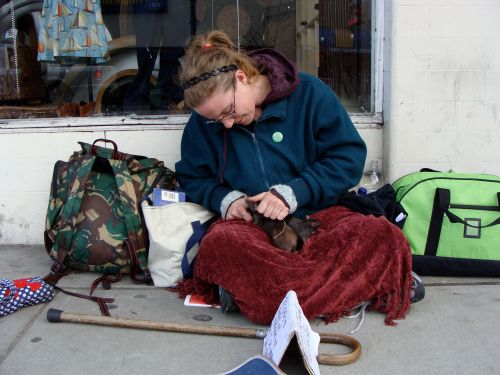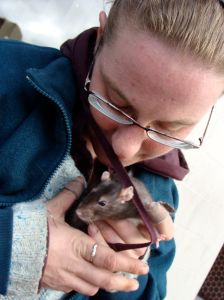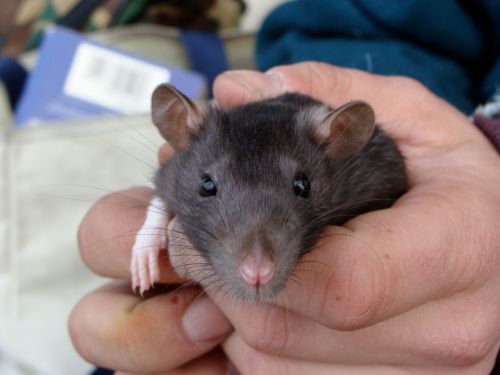Homeless find new ways to house four-legged friends
BY SARAH BERMAN, MEGAPHONE MAGAZINE
Jill Baron knows that caring for an animal is an immense responsibility.
Since she was four years old, Baron has been a devoted owner of many cats, dogs, birds and rodents. She even volunteered at the SPCA for 11 years. But last winter, Baron became homeless. Despite cold weather and colder criticism, Baron continues to care for three rats and two cats on the streets of Vancouver.
On a Commercial Drive sidewalk—in front of a Mr. Pets franchise—Baron sits cross-legged, reading a book. In front of her, she props up a small notebook that simply reads: ‘It’s easy to ignore me, but I do need your help.’
“I’ve gone without food for an entire day—many, many days—to make sure my pets ate well. Not just ate, but ate well,” she said, while motioning toward the rats tucked away in her jacket. “My oldest rat ever was seven years and four months old—which is impossible for a rat. They usually only live one to three years.”
Baron is just one of many homeless people in Vancouver who own a pet. Although many people think the homeless should not be allowed to care for animals, research shows a pet can be an important survival tool for a homeless person; and they often offer extra love and attention to their furry friends.
But homeless pet owners, until recently, have been largely left out in the cold. Just last year, most shelters in Vancouver would not allow pets to stay with their handlers. However, five new shelters that accept pets have finally given homeless pet owners and their companions a chance to get off the streets.
Mya Wollf, manager of the newly opened Stanley/New Fountain Shelter on Cordova Street, believes the city’s new shelters will help people like Baron get back on their feet and into permanent residence.
“Vancouver is moving in the right direction with pet allowances in shelters,” Wollf said.
In December, the municipal and provincial governments teamed up with the Street-to-Home Foundation to open five emergency, low-barrier shelters: First United Church, 240 Northern Way, 1435 Granville, the Stanley/New Fountain, and 1442 Howe. Since then, these shelters have put a roof over the heads of dozens of pets and their owners.
“We’ve got two dogs right now,” Wollf said. “It improves the morale just having a nice fuzzy creature around.”
In the small dimly-lit common room of the 28-bed shelter, a few friends fuss over a small white lapdog named Sarah.
“Sarah is a people dog,” owner Deborah Lowry said. “Everybody says she’s so cute.” Lowry and her dog have been staying at the New Fountain for the past two weeks. During her stay, the shelter has provided free food and treats for her closest companion. So far, Wollf says the shelter’s fourlegged patrons have not caused much trouble.
“I think there was just once when a dog got angry. It was because an owner was fighting, and was resolved really easily,” she said. “Most of the animals are fantastic.”
Despite the positive experiences of shelter workers like Wollf, many homeless pet owners wrestle with the stigma that they are unfit to care for their pets. Baron says it’s a minority of abusive owners who ruin the reputations of the majority.
“It doesn’t help there are people with dogs who are alcoholics or crack addicts, treating their dogs like crap,” Baron said. “People just look at them with disgust and turn around and look at us with disgust because we’re also homeless and we also have pets.”
Baron puts great effort into protecting her animals from the cold and offers them the same food she eats. She says the relationship shared with her pets is beyond description.
“I don’t think there’s any words for it. It’s what has kept me alive,” she said. “They have priority over everything else in my life.”
Kim Monteith is an animal welfare supervisor for the BC SPCA. She has devoted much of her career to the wellbeing of street pets and their handlers. Monteith assured many homeless pet owners like Baron defy negative stereotypes.
“Some see these people in the street and think, ‘They can’t take care of themselves—how can they take care of their dog?’ In reality, they are the first to call me if something goes wrong.”
The BC SPCA offers a number of free services for homeless pet owners, including pet food, veterinary clinics and counseling on proper training techniques. “We also do spay or neuters for free,” Monteith added. Monteith said street pets are generally pleasant and well-adjusted animals.
“The dogs are really well socialized because they’re exposed to everybody and everything,” she said. “It’s funny because they’re homeless, but they’re not. If they’re with their guardian, pets don’t care where they live.”
Dale McMann, Vancouver director of BC Housing, recognizes the importance of the human-animal bond. “There is now plenty of data that indicates pets provide their owners with a great deal of security and companionship,” he said. “Oftentimes, if people cannot bring their pet into a shelter they’ll choose to stay on the street.”
By allowing pets, shopping carts and other personal belongings in shelters, McMann hopes fewer people will choose to sleep outdoors. “This is a way of ensuring they are inside—that they’re accessing those shelters,” he added.
When asked why pet allowances were not introduced sooner, McMann said proper staff and control were not yet in place. “There were concerns in the past by the providers about trying to care for not only the homeless, but their pets as well.
“There were also concerns over whether they had the ability to control pets in certain environments. But the government has put a great deal more money into the shelter program, which has allowed us to staff more adequately.”
McMann noted there are still some restrictions on the kinds of pets, as well as the number of pets, the new shelters will allow. “In some cases I think there are conditions for the type of pets; you might not be able to bring in a snake or a dog that’s considered aggressive.”
Though Baron’s animals meet shelter requirements, she tends to avoid places with too many dogs. Baron’s rats—Dixie, Bear and Ree—stay with her at all times and often conflict with bigger animals. Her cats, Silver and Russer, are temporarily living with a friend in a nearby Single Room Occupancy (SRO) hotel.
When she can afford it, Baron prefers to stay in a private room at the Backpackers hostel. “They don’t mind my rats running around the room, which other places tend to have a problem with.”
Although temporary shelters offering pet-friendly accommodations are becoming more common, the number of social housing buildings that allow animals remains about the same. McMann estimated about half of Vancouver’s SROs and social housing projects let residents keep pets.
“I think everybody is starting to realize the importance of pets,” said Monteith. “All the shelters have been really supportive.”



